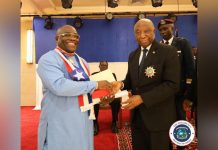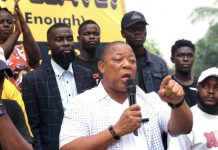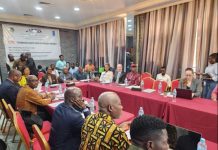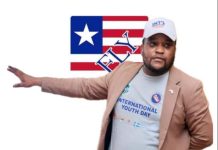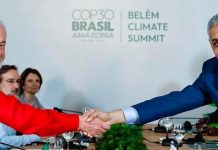Africa-Press – Liberia. Appearing before the Senate Committee on Hydrocarbon, Energy, and Environment on Wednesday, November 5, Lai said Liberia has learned valuable lessons from past mistakes and is putting in place stronger measures to safeguard the oil and gas sector for the benefit of Liberians.
The President-designate and Chief Executive Officer of the National Oil Company of Liberia (NOCAL), Fabian Lai, has outlined steps being taken by the Government of Liberia (GOL) to prevent foreign investors from profiteering from Liberia’s oil and gas resources to the detriment of the country and its people.
It can be recalled that Oranto Petroleum, owned by Nigerian businessman Arthur Price Eze, was in 2007 awarded three offshore oil blocks — LB 11, 12, and 14 — for US$200,000, but later sold them to Chevron in 2010, reportedly earning US$200 million from the transaction.
Under a new arrangement, Oranto and TotalEnergies have jointly been awarded eight oil blocks by the Liberian government in an agreement now before the National Legislature for ratification.
However, the deal has sparked serious opposition among lawmakers, with former Speaker J. Fonati Koffa and Representative Musa Hassan Bility among those calling for its outright rejection. The lawmakers argue that the deal heavily favors foreign interests and could repeat the mistakes of past arrangements that deprived Liberia of fair benefits from its natural resources.
Appearing before the Senate Committee on Hydrocarbon, Energy, and Environment on Wednesday, November 5, Lai said Liberia has learned valuable lessons from past mistakes and is putting in place stronger measures to safeguard the oil and gas sector for the benefit of Liberians.
“Though we want more companies to invest, the country’s interest and that of its citizens remain paramount,” he told the committee. “The Oranto/TotalEnergies agreement currently before the Legislature is a reflection of this commitment.”
Lai emphasized that the agreement places strong emphasis on environmental protection and community benefits.
“There are different ways our citizens will benefit through developmental impacts. It’s no longer going to be a Montserrado-only training program. Scholarship opportunities will cover all 15 counties,” he said.
“We need to diversify our revenue streams and ensure that the current inflow of resources is protected as we move into the future.”
He added that social welfare contributions will be made to support community projects across the 15 counties, while all revenues generated will go to the Consolidated Fund Account, allowing lawmakers to allocate funds for public benefit.
Building Capacity and Promoting Local Participation
Lai noted that NOCAL, which oversees 33 oil blocks across two basins, remains statutorily responsible for marketing and promoting the basins to attract investors. However, he admitted that limited financial resources have prevented the company from drilling oil wells, making it dependent on partnerships with foreign firms.
He explained that the Liberia Petroleum Regulatory Authority (LPRA) is responsible for issuing licenses and pre-qualifying companies based on their financial and technical capabilities.
According to Lai, the current petroleum agreement prioritizes training and development for Liberians through a trust fund jointly managed by NOCAL and the Ministry of Finance and Development Planning. He disclosed that NOCAL is also collaborating with the Liberia Business Association (LIBA) to prepare local entrepreneurs to participate in the oil and gas industry.
Commercial Viability Still Unconfirmed
Lai said Liberia’s oil reservoirs have not yet been confirmed as commercially viable.
“For the record, we wouldn’t be able to establish that our reservoir is commercially viable. What we’ve confirmed is that there’s a working petroleum system and a reservoir. Our ongoing exploration programs will determine the commercial potential,” he said.
He, however, noted that regional discoveries in Ivory Coast, Ghana, and Senegal have confirmed Liberia’s geological potential, making it an attractive destination for future drilling.
“The next biggest oil discovery in a frontier country that ensures lasting prosperity, energy security, and economic independence for Liberia—my answer is a resolute yes, we do,” he declared.
Vision for NOCAL
Lai outlined his vision to transform NOCAL into a modern, transparent, and vertically integrated oil and gas company.
“We will evolve from a passive holder of assets into a dynamic engine of national development, managing the entire oil and gas value chain for the benefit of every citizen,” he said.
His plan rests on five guiding principles, including data-driven sovereignty, stressing that Liberia’s petroleum data is a strategic national asset that must be secured and leveraged.
He pledged to increase government ownership and maximize national benefits from the oil and gas sector while attracting a diverse mix of global and local partners. Training and capacity-building programs, he said, would equip Liberians to compete effectively in the sector.
Among his proposed ten strategic focus areas are building a comprehensive data library to guide informed decision-making, establishing a centralized geoscience data repository to consolidate seismic and production information, launching a public data platform for industry stakeholders by his second year in office, conducting aggressive international marketing campaigns for Liberia’s oil basins; and training more than 1,000 Liberian professionals over the next five years.
Lai also called for the declaration of a National First Oil Target, aligned with production-readiness timelines, and a new policy framework for exploration modernization within 12–18 months.
He concluded by saying that any company seeking to acquire oil blocks in Liberia would be required to obtain LPRA approval and pay new transaction fees to the government.
For More News And Analysis About Liberia Follow Africa-Press


